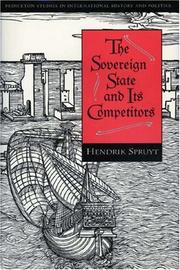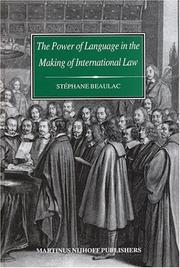| Listing 1 - 10 of 16 | << page >> |
Sort by
|
Book
ISBN: 9038707053 9789038707051 Year: 1999 Publisher: Arnhem Gouda Quint
Abstract | Keywords | Export | Availability | Bookmark
 Loading...
Loading...Choose an application
- Reference Manager
- EndNote
- RefWorks (Direct export to RefWorks)
Vázquez de Menchaca, Fernando --- Sovereignty --- Natural law --- History. --- Sovereignty - History. --- Natural law - History.

ISBN: 0691033560 0691029105 9780691029108 9780691033563 Year: 1996 Publisher: Princeton, N.J. : Princeton University Press,
Abstract | Keywords | Export | Availability | Bookmark
 Loading...
Loading...Choose an application
- Reference Manager
- EndNote
- RefWorks (Direct export to RefWorks)
History of Europe --- Political philosophy. Social philosophy --- Sovereignty --- History --- Europe --- Politics and government --- History. --- Souveraineté --- Histoire --- Politics and government. --- Politique et gouvernement --- Sovereignty - History. --- Political systems --- Theory of the state --- World history --- Sovereignty - History --- Europe - Politics and government
Book
ISBN: 2275026835 9782275026831 Year: 2006 Volume: 128 Publisher: Paris: Librairie générale de droit et de jurisprudence,
Abstract | Keywords | Export | Availability | Bookmark
 Loading...
Loading...Choose an application
- Reference Manager
- EndNote
- RefWorks (Direct export to RefWorks)
Il est habituel de présenter Jean-Jacques Rousseau comme le " père ", de la Révolution française, plus particulièrement comme l'inspirateur des Jacobins. Les relations entretenues par ceux-ci avec le philosophe ont cependant été examinées sous un angle plus philosophique que juridique. La présente étude tente de remédier à cette carence. Rousseau et les Jacobins sont d'accord sur un mot d'ordre : la souveraineté appartient au peuple. On s'aperçoit cependant que les termes " peuple et " souveraineté " reçoivent des acceptions très différentes. Ces divergences apparaissent nettement en matière d'exercice de la souveraineté : les Jacobins se rallient en masse au principe représentatif, lequel était pourtant vigoureusement condamné par l'auteur du Contrat social. La définition du peuple, la détermination de la souveraineté et de la représentation mettent en valeur l'autonomie intellectuelle des Jacobins. Rousseau fournit un arsenal idéologique dans lequel les Jacobins puisent librement : le tri qu'ils opèrent parmi les propositions du Genevois dessine l'originalité d'une politique qui obéit aux circonstances révolutionnaires bien plus qu'à une fidélité béate aux recommandations de Jean-Jacques. Cette originalité s'illustre dans le domaine des institutions publiques : Rousseau n'est présent que par la force des principes et les Jacobins ont toute latitude pour conquérir et exercer le pouvoir. Celui-ci est tout entier orienté vers le but mirifique de la régénération. Lorsqu'il s'agit d'instituer le peuple, les Jacobins retrouvent de nets accents rousseauistes et inscrivent leur réflexion sur l'éducation, la religion et le patriotisme dans le cadre conceptuel élaboré par Rousseau. C'est en ce sens qu'il faut évoquer une " traduction " jacobine des principes de Rousseau. Les Jacobins utilisent les catégories proposées par le Genevois, mais n'hésitent pas, une fois placés au cœur du système rousseauiste, à en écarter certaines conséquences qui ne seraient pas en adéquation avec les exigences de la Révolution.
Jacobins --- Representative government and representation --- Club des Jacobins --- Gouvernement représentatif --- Rousseau, Jean-Jacques, --- Political and social views --- France --- History --- Societies, etc. --- Histoire --- Associations --- Sovereignty --- Gouvernement représentatif --- Political and social views. --- Jacobins - France - History - 18th century. --- Sovereignty - History - 18th century.
Book
ISBN: 9782348042140 2348042142 Year: 2020 Publisher: Paris : La Découverte,
Abstract | Keywords | Export | Availability | Bookmark
 Loading...
Loading...Choose an application
- Reference Manager
- EndNote
- RefWorks (Direct export to RefWorks)
"Il est courant de déplorer le déclin de la souveraineté de l'État-nation, qui semble devoir être aujourd'hui supplantée par la puissance du capital mondial. Restaurer la verticalité de l'État et son autorité serait ainsi la seule voie pour contester le globalisme néolibéral. C'est contre cette illusion, encore trop répandue à gauche, que Pierre Dardot et Christian Laval ont entamé ce long parcours dans l'histoire complexe et singulière de l'État occidental moderne, depuis sa naissance à partir du modèle de l'Église médiévale jusqu'à son rôle actuel d'État-stratège dans la concurrence mondiale. Comprendre les aléas et les détours de cette construction, c'est mettre à nu les ressorts d'une domination sur la société et sur chacun de ses membres qui est fondamentalement de l'ordre de la croyance : les « mystères de l'État », le culte de sa continuité qui oblige ses représentants par-delà leur succession, la sacralité dont ces derniers aiment à s'entourer dans l'exercice de leurs fonctions, autant d'éléments qui ont pu changer de forme, mais qui demeurent au principe de sa puissance. En retraçant cette généalogie, il s'agit pour les auteurs de montrer que l'on ne peut répondre aux défis de la mondialisation capitaliste et du changement climatique sans remettre en cause cet héritage. Car l'invocation de la souveraineté « nationale » est devenue l'alibi de l'inaction climatique et de la perpétration des écocides. Pour affronter ces enjeux globaux, il est indispensable de s'attaquer àun tel régime d'irresponsabilité politique qui dispense les gouvernants de rendre des comptes aux citoyens. C'est dire qu'il faut ouvrir la voie à un au-delà de la souveraineté étatique" (4ème de couv.)
État. --- Souveraineté --- Nation --- Philosophie --- Histoire. --- Sovereignty --- State, The --- History. --- History --- Western countries --- Politics and government --- SOVEREIGNTY --- STATE, THE --- Politics and government. --- Philosophy --- Sovereignty - History. --- State, The - History --- Western countries - Politics and government

ISBN: 2070329321 9782070329328 Year: 1997 Volume: 299 Publisher: Paris : Gallimard,
Abstract | Keywords | Export | Availability | Bookmark
 Loading...
Loading...Choose an application
- Reference Manager
- EndNote
- RefWorks (Direct export to RefWorks)
L'auteur décrit les étapes historiques de la théorisation du principe de souveraineté et ses fondements métaphysiques, juridiques et éthiques.
Sovereignty --- 32 --- CDL --- State sovereignty (International relations) --- International law --- Political science --- Common heritage of mankind (International law) --- International relations --- Self-determination, National --- History --- Law and legislation --- Etat --- Histoire --- Moderne --- Philosophie --- Politique --- Souverainete --- Theorie --- Independance --- Pensee --- Sovereignty. --- History. --- Souveraineté --- Souveraineté --- Sovereignty - History. --- Theories de l'etat
Book
ISBN: 9782406097846 9782406097839 2406097838 2406097846 Year: 2020 Volume: 20 Publisher: Paris: Classiques Garnier,
Abstract | Keywords | Export | Availability | Bookmark
 Loading...
Loading...Choose an application
- Reference Manager
- EndNote
- RefWorks (Direct export to RefWorks)
Ces actes de séminaire international sont une partie des résultats d'un travail collectif de sept ans, de 2011 à 2018. Du Moyen Âge à la Révolution, les dix-huit chapitres envisagent leur objet, le(s) Parlement(s) de la France d'Ancien Régime, au sens large de ces termes, en une perspective résolument interdisciplinaire et évolutive. Sous l'angle institutionnel tout autant que culturel, les différentes faces et phases de ce cœur de l'État de la France ancienne se révèlent dans toute leur complexité, politique, philosophique, religieuse et sociologique. Autour des problématiques de la souveraineté, du pouvoir « absolu » et de sa remise en cause, du droit et du juste, ces cours se firent le creuset d'une modernité politique à la française.
Government --- History of France --- anno 1500-1799 --- anno 1400-1499 --- Legislative bodies --- Parlements --- History --- Parlements (French courts) --- State, The --- Sovereignty --- Parliamentary practice --- Justice, Administration of --- Congresses --- France --- Politics and government --- Parlements (French courts) - History - Congresses --- State, The - History - Congresses --- Sovereignty - History - Congresses --- Parliamentary practice - France - History --- Justice, Administration of - France - History - Congresses --- France - Politics and government - History

ISBN: 9004136983 9789004136984 9781429414548 1429414545 1280914866 9781280914867 9786610914869 6610914869 9047404874 9789047404873 Year: 2004 Volume: 46 Publisher: Leiden Boston Martinus Nijhoff Publishers
Abstract | Keywords | Export | Availability | Bookmark
 Loading...
Loading...Choose an application
- Reference Manager
- EndNote
- RefWorks (Direct export to RefWorks)
The purpose of this book is to enter into the history of the mental-social phenomena that are the word sovereignty and the myth of Westphalia. Given the circularity of language, the project proposes to examine the reality-creating role of language, as an organic instrument of social power within humanity. In semiotic terms, the complex structures of words and also myths form part of sign-systems in which they can both represent and create reality. These are the passive and active functions of language, which explain that words and myths not only represent and describe reality but may also play a leading part in creating and transforming reality, thus demonstrating and being used to carry fabulous power within humanity. The Peace of Westphalia is analysed to show that, in spite of what actually took place in 1648, Westphalia has had an incredible social effect in international law, standing for the proposition that it signalled the beginning of a new era based on state sovereignty. However, it is argued that Westphalia constitutes a myth, an aetiological myth, which has provided a way for society to explain itself to itself, that is, a way for international society to explain its genesis to itself. As regards sovereignty , it is shown that Jean Bodin introduced the word in Six Livres for the purpose of having the French ruler enjoy supreme power in the hierarchical organisation structure of society. This is the original creative and transforming social effect on the shared consciousness of humanity for which the linguistic sign must be credited, which has continued, unaltered, to this day. With respect to Droit des Gens , it is demonstrated that Emer de Vattel utilised and actually changed the reality associated with sovereignty also for a specific reason, namely, to carry out its externalisation - the ruling entity was now to enjoy exclusive power to govern, which entailed being the sole representative of the people both internally and externally, and also meant that it could not be submitted to any foreign state or to any higher law externally. Vattel's use of the word has had an extraordinary effect on the shared consciousness of society, including that of the emerging international society, which is still very much present today. These two archetype cases in which 'sovereignty' developed show how this word has really had two paradigms over the years, that is, it has represented and created the two distinct realities of the internal and the international.
Thirty Years' War, 1618-1648 --- Sovereignty --- Peace --- History --- Language --- Counter-Reformation --- State sovereignty (International relations) --- International law --- Political science --- Common heritage of mankind (International law) --- International relations --- Self-determination, National --- Law and legislation --- Peace. --- History. --- Language. --- Thirty Years' War, 1618-1648 - Peace --- Sovereignty - History --- Sovereignty - Language
Book
ISBN: 9780521857772 9780521674485 9781139046527 9781461936763 1461936764 1139046527 1299772943 9781299772946 9781107291102 1107291100 0521857775 1139890247 9781139890243 1107289432 9781107289437 1107289009 9781107289000 0521674484 1107290058 9781107290051 1107293898 9781107293892 1107292824 9781107292826 Year: 2013 Publisher: Cambridge, United Kingdom
Abstract | Keywords | Export | Availability | Bookmark
 Loading...
Loading...Choose an application
- Reference Manager
- EndNote
- RefWorks (Direct export to RefWorks)
We live today in the first global system of sovereign states in history, encompassing all of the world's polities, peoples, religions and civilizations. Christian Reus-Smit presents a new account of how this system came to be, one in which struggles for individual rights play a central role. The international system expanded from its original European core in five great waves, each involving the fragmentation of one or more empires into a host of successor sovereign states. In the most important, associated with the Westphalian settlement, the independence of Latin America, and post-1945 decolonization, the mobilization of new ideas about individual rights challenged imperial legitimacy, and when empires failed to recognize these new rights, subject peoples sought sovereign independence. Combining theoretical innovation with detailed historical case studies, this book advances a new understanding of human rights and world politics, with individual rights deeply implicated in the making of the global sovereign order.
Civil rights --- Human rights --- Sovereignty --- History --- State sovereignty (International relations) --- International law --- Political science --- Common heritage of mankind (International law) --- International relations --- Self-determination, National --- History. --- Law and legislation --- Social Sciences --- Political Science --- Civil rights - History --- Human rights - History --- Sovereignty - History
Book
ISBN: 9782503533094 2503533094 9782503539454 Year: 2011 Volume: 28 Publisher: Turnhout : Brepols,
Abstract | Keywords | Export | Availability | Bookmark
 Loading...
Loading...Choose an application
- Reference Manager
- EndNote
- RefWorks (Direct export to RefWorks)
Sovereignty, law, and the relationship between them are now among the most compelling topics in history, philosophy, literature and art. Some argue that the state’s power over the individual has never been more complete, while for others, such factors as globalization and the internet are subverting traditional political forms. This book exposes the roots of these arguments in the Middle Ages and Renaissance. The thirteen contributions investigate theories, fictions, contestations, and applications of sovereignty and law from the Anglo-Saxon period to the seventeenth century, and from England across western Europe to Germany, France, Italy, and Spain. Particular topics include: Habsburg sovereignty, Romance traditions in Arthurian literature, the duomo in Milan, the political theories of Juan de Mariana and of Richard Hooker, Geoffrey Chaucer’s legal problems, the accession of James I, medieval Jewish women, Elizabethan diplomacy, Anglo-Saxon political subjectivity, and medieval French farce. Together these contributions constitute a valuable overview of the history of medieval and Renaissance law and sovereignty in several disciplines. They will appeal not only to political historians, but also to all those interested in the histories of art, literature, religion, and culture.
History of the law --- History of civilization --- anno 500-1499 --- anno 1600-1699 --- anno 1500-1599 --- Western Europe --- Souveraineté --- --Moyen âge, --- Renaissance --- --Constitution --- --Histoire --- --Congrès --- --2008 --- --Tempe --- --actes --- --Constitutional history --- Law, Medieval --- Sovereignty --- Sovereignty in literature --- History --- Constitutional history --- Recht. --- Soevereiniteit. --- Middeleeuwen. --- Renaissance. --- Congresses --- Law - Non-U.S. --- Law, Politics & Government --- Law - Europe, except U.K. --- Europe [Western ] --- Law [Medieval ] --- Moyen âge, 476-1492 --- Constitution --- Histoire --- Congrès --- Constitutional history - Europe, Western - Congresses --- Law, Medieval - Congresses --- Sovereignty - History - To 1500 - Congresses --- Sovereignty - History - 16th century - Congresses --- Sovereignty in literature - Congresses --- Tempe --- State sovereignty (International relations) --- International law --- Political science --- Common heritage of mankind (International law) --- International relations --- Self-determination, National --- Constitutional history, Modern --- Constitutional law --- Constitutions --- Law and legislation --- Europe de l'Ouest --- Jusqu'à 1500 --- 16e siècle --- Dans la littérature --- Histoire constitutionnelle --- Souveraineté --- Jusqu'à 1500 --- 16e siècle --- Dans la littérature --- Congrès
Book
ISBN: 9004321195 9004319131 9789004319134 9789004319134 Year: 2016 Publisher: Boston : Brill,
Abstract | Keywords | Export | Availability | Bookmark
 Loading...
Loading...Choose an application
- Reference Manager
- EndNote
- RefWorks (Direct export to RefWorks)
Over recent decades, the responsibility for the past actions of the European colonial powers in relation to their former colonies has been subject to a lively debate. In this book, the question of the responsibility under international law of former colonial States is addressed. Such a legal responsibility would presuppose the violation of the international law that was applicable at the time of colonization. In the ‘Scramble for Africa’ during the Age of New Imperialism (1870-1914), European States and non-State actors mainly used cession and protectorate treaties to acquire territorial sovereignty (imperium) and property rights over land (dominium). The question is raised whether Europeans did or did not on a systematic scale breach these treaties in the context of the acquisition of territory and the expansion of empire, mainly through extending sovereignty rights and, subsequently, intervening in the internal affairs of African political entities.
Africa, Sub-Saharan --- Land tenure --- Sovereignty --- State sovereignty (International relations) --- International law --- Political science --- Common heritage of mankind (International law) --- International relations --- Self-determination, National --- Agrarian tenure --- Feudal tenure --- Freehold --- Land ownership --- Land question --- Landownership --- Tenure of land --- Land use, Rural --- Real property --- Land, Nationalization of --- Landowners --- Serfdom --- International status --- History --- Law and legislation --- Africa, Black --- Africa, Subsaharan --- Africa, Tropical --- Africa South of the Sahara --- Black Africa --- Sub-Sahara Africa --- Sub-Saharan Africa --- Subsahara Africa --- Subsaharan Africa --- Tropical Africa --- Colonization --- Africa, Sub-Saharan - International status - History - 19th century --- Africa, Sub-Saharan - International status - History - 20th century --- Land tenure - Law and legislation - Africa, Sub-Saharan - History - 19th century --- Land tenure - Law and legislation - Africa, Sub-Saharan - History - 20th century --- Sovereignty - History - 19th century --- Sovereignty - History - 20th century --- Statut International --- XIXe-XXe s., 1801-2000 --- Régime foncier --- Droit --- Législation --- Souveraineté --- Colonisation --- Afrique subsaharienne --- Africa, Sub-Saharan - Colonization - Case studies
| Listing 1 - 10 of 16 | << page >> |
Sort by
|

 Search
Search Feedback
Feedback About UniCat
About UniCat  Help
Help News
News